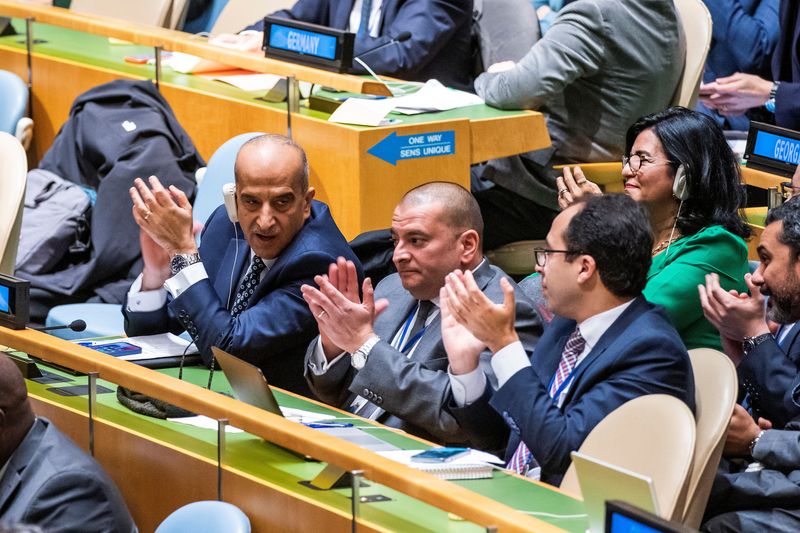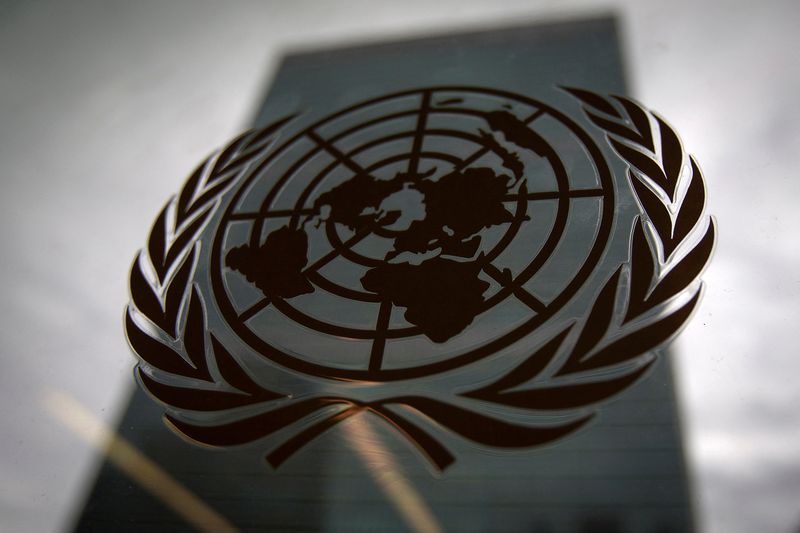By Michelle Nichols
UNITED NATIONS (Reuters) - The United Nations on Tuesday demanded an immediate humanitarian ceasefire in the Israel-Hamas war after more than three-quarters of the 193-member General Assembly backed the move, which had been vetoed by the United States in the Security Council last week.
The United States does not have a veto in the General Assembly. It voted against the resolution, along with Israel and eight other countries. The resolution was adopted to a round of applause with 153 votes in favor, while 23 countries abstained from the vote.
Palestinian U.N. envoy Riyad Mansour, citing large pro-Palestinian protests around the world, said the U.S. could not continue "to ignore this massive power." He described the General Assembly vote as a culmination of public sentiment.
"It is our collective duty to continue on this path until we see an end to this aggression against our people, to see this war stopping against our people. It is our duty to save lives," he told reporters, with Arab ambassadors standing alongside him.
Before the U.N. vote, U.S. President Joe Biden told a fundraising event for his 2024 re-election campaign that Israel was losing international support because of "indiscriminate bombing that takes place."
Israel has bombarded Gaza from the air, imposed a siege and launched a ground offensive in retaliation for an Oct. 7 attack by Hamas that Israel says killed 1,200 people and saw 240 people taken hostage. Gaza's health ministry says 18,205 Palestinians have been killed and nearly 50,000 wounded.
General Assembly resolutions are not binding but carry political weight, reflecting a global view on the war. U.N. Secretary-General Antonio Guterres has long called for a humanitarian ceasefire and last week made the rare move to warn the Security Council of the global threat posed by the war.
U.S. Ambassador to the U.N. Linda Thomas-Greenfield told the General Assembly before the vote that there were aspects of the resolution that the U.S. supported, such as the need to urgently address the dire humanitarian situation in Gaza, protect civilians and free hostages.
But she added: "Any ceasefire right now would be temporary at the best and dangerous at worst - dangerous to Israelis, who would be subject to relentless attacks, and also dangerous to Palestinians, who deserve the chance to build a better future for themselves, free from Hamas."
'DEATH SENTENCE'
The General Assembly resolution also demands the immediate and unconditional release of all hostages and that the warring parties comply with international law, specifically with regard to the protection of civilians.
An attempt by the United States to amend the text to include a rejection and condemnation of "the heinous terrorist attacks by Hamas ... and the taking of hostages" and a bid by Austria to add that the hostages were being held by Hamas both failed to get the two-thirds majority support needed to pass.
Pakistan's U.N. Ambassador Munir Akram argued against both the proposed amendments to name Hamas, saying that any blame "has to be placed on both parties, especially on Israel."
"When you deny people freedom and dignity, when you humiliate and trap them in an open air prison, where you kill them as if they were beasts - they become very angry and they do to others what was done to them," he told the General Assembly.
Most of the 2.3 million people in Gaza have been driven from their homes and the United Nations has given dire warnings about the humanitarian situation in the coastal enclave, saying that hundreds of thousands of people are starving.
The United States and Israel oppose a ceasefire because they believe it would only benefit Hamas. Washington instead supports pauses in fighting to protect civilians and allow the release of hostages taken by Palestinian militants on Oct. 7.
A seven-day pause - during which Hamas released some hostages, some Palestinians were freed from Israeli jails and there was an increase in badly needed humanitarian aid to Gaza - ended on Dec. 1.
"A ceasefire means one thing and one thing only - ensuring the survival of Hamas, ensuring the survival of genocidal terrorists committed to the annihilation of Israel and Jews," Israel's U.N. Ambassador Gilad Erdan said ahead of the vote.

"A ceasefire is a death sentence for countless more Israelis and Gazans," he told the General Assembly. "By voting in favor of this resolution you are supporting the survival of Jihadist terror and the continued suffering of people of Gaza."
In October the General Assembly called for "an immediate, durable and sustained humanitarian truce leading to a cessation of hostilities" in a resolution adopted with 121 votes in favor, 14 against - including the U.S. - and 44 abstentions.
